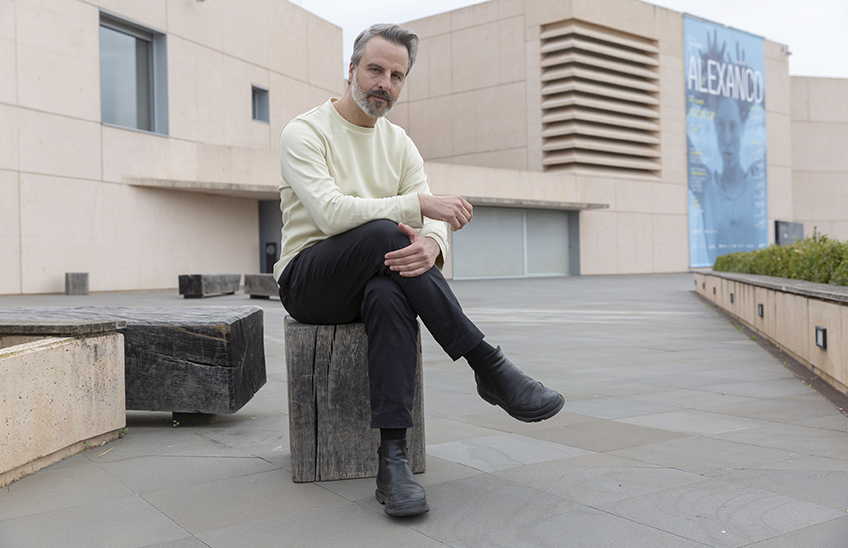Choreographer Antonio Ruz at the MUN: "Pharsalia is a hymn to freedom, to hope and to dance as a nuclear weapon of salvation".
The Antonio Ruz Company previews on Friday 14, at 19:30 h., the contemporary dance show 'Pharsalia', a deep anti-war song inspired by the homonymous poem by Lucan (s.I).

PhotoManuelCastells/Choreographer and dancer Antonio Ruz at the Museo Universidad de Navarra
11 | 10 | 2022
Theinexhaustible curiosity of Antonio Ruz (Córdoba, 1976), National Dance Prize 2018, led the choreographer and dancer to approach the. Pharsalia or Bellum Civile, by Lucan, also from Cordoba, an epic poem about war written in the 1st century. Its profound message in favor of the victims encouraged him to continue exploring from his terrain, through the body in movement, through dance. This was the seed that gave birth to Pharsalia, the show that the Antonio Ruz Company previews this Friday 14, at 19.30 pm, at the Teatro del Museo Universidad de Navarra, within the cycle Museo en Danza. Tickets are 24 and 26 euros.
"Pharsalia is a hymn to freedom, hope and dance as a nuclear weapon of salvation," said Ruz about the proposal, which has presented Thursday accompanied by Alvaro Sanchez Ostiz, professor of Latin Philology at the University of Navarra and one of the collaborators of the choreographer; Nieves Acedo, director of Programs of the Museum; and Teresa Lasheras, director of Performing Arts and Music. The project has participated in the Museum's artistic residency program and has had the collaboration of researchers Javier Andreu (Department of History) and Daniel Doyle (Department of Philosophy) through a research seminar. "The Museum does not program works, but accompanies the artists with respect, affection and good work," said Ruz.
ANTI-WAR MESSAGE
It is a large-scale work that brings to the stage eleven dancers of five nationalities to convey a profound anti-war chant based on the story told by Lucan, the civil war between Julius Caesar and Pompey Magnus, which acquires a universal character. "From his exaltation of the victims, of the defeated, of the universality of war, the idea of the body at war came into my head, which we could say is the subtitle of the work and has very diverse interpretations. I also wondered if there is beauty in the chaos of war," explained the choreographer, who addresses these issues through dance.
The result is a contemporary piece, with an amazing scenography and music created specifically for it, which invites reflection: "Talking about war is also talking about internal, psychological conflict. Dance has a transforming power and makes you take care of your body and other bodies". In this sense, although the choreographer recognizes that there are "many parallels with reality", referring to the war in Ukraine and other armed conflicts that are currently taking place, he claims his vocation to "be very faithful to universality".
THOROUGH INVESTIGATION
For the research, Ruz also traveled to Rome to delve into the historical context and visit key museums and archaeological sites, and shared ideas and questions with researchers from the University of Navarra. Sánchez Ostiz, who helped him tackle the complexity of the classical work, explained that "Pharsalia is not an easy text. It is an explosion of very deep feelings and a different worldview". In his collaboration, he indicated to the company how to recite the Latin correctly. "We thought it was very interesting for the spectator to come into direct contact with the context of the play. There are fragments of the text recited by the dancers themselves, who dance their words, their voice," said the choreographer.
To deepen in this choreographic proposal and in its genesis, this Tuesday 11, at 7 pm, will take place the encounter How to do things with...the poem Pharsalia by Lucanomoderated by Nieves Acedo, and with the participation of Antonio Ruz, professor Álvaro Sánchez Ostiz and the illuminator Olga García. Admission is free with prior withdrawal of invitation until full capacity is reached. After its run at the MUN, the work will come to Madrid's Teatros del Canal, and to Cordoba and Seville.